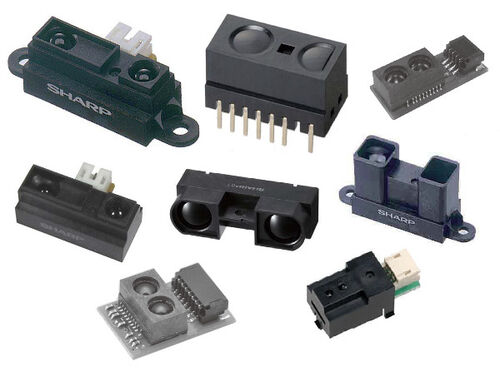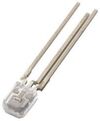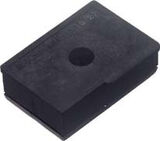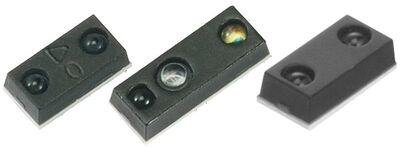Sharp Sensors
Sensor is a device, whose purpose is to detect events or changes in its environment and send the information to other electronics, frequently a computer processor.
The resolution of a sensor is the smallest change it can detect in the quantity, that it is measuring.
Tabs
Distanzmesssensoren
Gebräuchlich ist für diese Art des Sensors oft die englische Bezeichnung Distance Measuring Sensor (kurz: DMS). Ihr Aufbau besteht ebenfalls aus einem IR Emitter (IR LED), einer flächenförmigen Anordnung von Detektoren (Position Sensitive Detector (kurz: PSD) oder einem CMOS Image Sensor sowie einer integrierten Schaltung zur Signalauswertung.
Der Aufgabenbereich dieses Sensors ist dabei, im Gegensatz zum Näherungssensor, einen konkreten Distanzwert anhand des Triangulationsprinzips festzustellen. Hierbei wird nicht die Intensität des reflektierten Lichts zur Berechnung der Distanz herangezogen, sondern die Änderung des Winkels des auf den Detektor einfallende Reflexionslichts: je näher ein Objekt sich auf den Sensor zubewegt, desto größer wird der Winkel zwischen ausgesendetem und reflektiertem IR-Licht. Diese Methode der Distanzmessung ist zwar aufwändiger, jedoch wesentlich präziser, da deutlich weniger Abhängigkeit von den Oberflächeneigenschaften des Objekts besteht.
| Detecting Distance (cm), min. | Detecting Distance (cm), max. | Product | Type | Dissipation Operating Current (mA), typ. | Dissipation Operating Current (mA), max. | Response Time (ms), max. | Operating Temperature Range | |
|---|---|---|---|---|---|---|---|---|
| 10.0 | 80.0 | GP2Y0A21YK0F | Analog | 30 | 40 | 39 | -10 ~ +60 °C | Download |
| 4.0 | 30.0 | GP2Y0A41SK0F | Analog | 12 | 22 | 17 | -10 ~ +60 °C | Download |
| 4.0 | 50.0 | GP2Y0E02A | Analog | 26 | 36 | 40 | -10 ~ +60 °C | Download |
| 4.0 | 50.0 | GP2Y0E02B | Analog | 26 | 36 | 40 | -10 ~ +60 °C | Download |
| 4.0 | 50.0 | GP2Y0E03 | Analog | 26 | 36 | 40 | -10 ~ +60 °C | Download |
| 10.0 | 150.0 | GP2Y0A60SZ0F | Analog | 33 | 50 | 17 | -10 ~ +60 °C | Download |
| 20.0 | 150.0 | GP2Y0A02YK0F | Analog | 33 | 50 | 39 | -10 ~ +60 °C | Download |
| 100.0 | 550.0 | GP2Y0A710K0F | Analog | 30 | 50 | 22 | -10 ~ +60 °C | Download |
| 1.25 | 1.50 | GP2Y5D91S00F | Digital | 7 | 12 | -30 ~ +105 °C | Download | |
| 8.0 | 13.0 | GP2Y0D810Z1F | Digital | 5 | 6.5 | 4 | -40 ~ +85 °C | Download |
| 21.0 | 27.0 | GP2Y0D21YK0F | Digital | 33 | 40 | 39 | -10 ~ +60 °C | Download |
| 11.5 | 14.5 | GP2Y0D413K0F | Digital | 14 | 27 | -10 ~ +60 °C | Download | |
| 70.0 | 90.0 | GP2Y0D02YK0F | Digital | 33 | 50 | 39 | -10 ~ +60 °C | Download |
| 0.45 | 0.6 | GP2Y0AH01K0F | Analog | 20 | 40 | 52,9 | -10 ~ +60 °C | Download |
Features:
- Output type: digital / analog
- Distance type: short / long
- Low profile package size
- Consumption current (mA, typ.): 5 / 7 / 14 / 30 / 33
- Battery drive compatible, supply voltage : 2.7 to 6.2 V
- Low voltage operation
- Sunlight tolerance
- High-precision measurement
Applications:
- Touch-less switch
(Sanitary equipment, Control of illumination, etc. ) - Robot cleaner
- Human type Robot
- Human body detector
- Sensor for energy saving
(ATM, Copier, Vending machine) - Amusement equipment
(Robot, Arcade game machine) - Projector (for auto focus)
- Auto-switch for illumination
- etc.
Tabs
Umgebungslichtsensoren
Umgebungslichtsensoren sind Fotodetektoren, deren spektrale Empfindlichkeit der des menschlichen Auges ähnlich ist. Es ist somit möglich die Lichtintensität quantitativ zu messen, wie sie vom menschlichen Auge empfunden wird.
| IIluminance Range eV (lx), min | IIluminance Range eV (lx), max. | Product | Supply Current (μA) | Peak Sensitivity (nm) | Operating Supply Voltage (V) | |
|---|---|---|---|---|---|---|
| 10 | 10000 | GA1A2S100SS | 50 | 555 | 2.7 – 3.6 | Download |
| 10 | 10000 | GA1A2S100LY | 500 | 555 | 2.7 – 3.6 | Download |
| 3 | 55000 | GA1A1S202WP | 70 | 555 | 2.3 – 3.2 | Download |
| 3 | 55000 | GA1A1S203WP | 70 | 555 | 2.3 – 3.2 | Download |
| 3 | 55000 | GA1A1S204WP | 70 | 555 | 2.3 – 3.2 | Download |
| 10 | 5000 | GA1A1S100WP | 1460 | 555 | 2.7 – 3.6 | Download |
Features:
- Linear output, suitable for indoor or outdoor use
- Light sensitivity and response curve similar to that of the human eye
- OPIC light detector: integrated photodiode and signal processing circuit
- Stable over specified temperature range
- Lead-free and RoHS-directive compliant
Applications:
- Auto-dimming circuits
- Office automation equipment
- Audio visual equipment
- Home appliances
- Touch panels
- Mobile phones
Tabs
Staubsensoren
Staubsensoren beinhalten einen IR Emitter (Leuchtdiode, LED) und Detektor. Festgestellt wird bei diesem Sensor die Streupartikeldichte in der Luft: Der Emitter und Detektor sind diagonal zueinander angeordnet, sodass (fast) kein Licht auf den Detektor fällt, wenn sich keine Staubpartikel in dem Luftspalt des Sensors befinden. Sobald Staubpartikel in den Luftspalt des Sensors eindringen, verursachen diese eine Streuung des Lichts, welches vom Detektor empfangen wird. Mit zunehmender Partikelkonzentration empfängt der Detektor mehr Licht und gibt dies entsprechend als äquivalente Spannung aus. Dieser Staubsensor detektiert lediglich die Änderung eines kalibrierten Umgebungszustandes / Partikelkonzentration in der Luft.
| Sensitivity (mg/m³) | Product | Average Power Consumption (mA) | Response Time (ms) | Operating Temperature Range | Operating Supply Voltage (V) | |
|---|---|---|---|---|---|---|
| 0.5 V / 0.1 | GP2Y1010AU0F | 11 | 0.28 | -10 ~ +65 °C | 4.5 – 5.5 | Download |
Features:
- Compact, thin package (46.0 × 30.0 × 17.6 mm)
- Low consumption current (Icc: MAX. 20 mA)
- The presence of dust can be detected by the photometry of only one pulse
- Enable to distinguish smoke from house dust
- Lead-free and RoHS directive complian
Applications:
- Detecting of dust in the air.
- Air purifier, Air conditioner, Air monitor, etc.
Tabs
Näherungssensoren
Ein Näherungssensor beinhaltet einen Infrarot Emitter (kurz: IR, üblich 850 – 940 nm), einen Detektor sowie die Ansteuer- und Auswerte-Elektronik. Das Funktionsprinzip ist einfach: Der Emitter sendet IR-Licht aus. Objekte, die sich dem Sensor nähern, werden durch die Lichtstreuung an ihrer Oberfläche, die in den Detektor zurück reflektiert wird, erkannt. Die Logik setzt diese detektierten Reflektionen dann in ein Signal um und stellt dabei lediglich die Präsenz eines Objekts fest. Ein klassisches Beispiel sind Händetrockner oder Bewegungsmelder.
| Detecting Distance (mm), min. | Detecting Distance (mm), max. | Product | Dissipation current ICC (µA) typ. | Power Supply Voltage VCC (V) | Operating Temperature Range | Response time tPHL, tPLX (ms), max. | Design | |
|---|---|---|---|---|---|---|---|---|
| 25 | 150 | GP2AP002S30F | 240 | -0.3 ~ 3.8 | -25 ~ +85 °C | 50 | Standard | Download |
| 25 | 150 | GP2AP002A00F | 270 | 2.4 ~ 3.6 | -25 ~ +85 °C | Mit integriertem Umgebungslichtsensor | Download | |
| 58 | 142 | GP2AP030A00F | 65 | -0.3 ~ 5.7 | -35 ~ +85 °C | Mit integriertem Umgebungslichtsensor | Download |
Features:
- Compact and thin package
- I2C interface compatible
- Integrated ambient light sensor
- LED and ambient light sensor combined in a signal package
- Built-in LED for simple optical design
Applications:
- Touch panel false-operation countermeasures
- Touch panel energy-saving features
- Function automation features
- Backlight brightness control function
- Mobile phone, Smartphone, Tablet
- Digital single-lens reflex camera
- etc.










